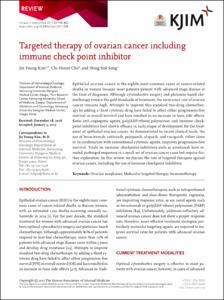KUMEL Repository
1. Journal Papers (연구논문)
1. School of Medicine (의과대학)
Dept. of Obstetrics & Gynecology (산부인과학)
Targeted therapy of ovarian cancer including immune check point inhibitor
- Keimyung Author(s)
- Cho, Chi Heum; Kim, Jin Young; Song, Hong Suk
- Journal Title
- Korean Journal of Internal Medicine
- Issued Date
- 2017
- Volume
- 32
- Issue
- 5
- Abstract
- Epithelial ovarian cancer is the eighth most common cause of cancer-related deaths in women because most patients present with advanced stage disease at the time of diagnosis. Although cytoreductive surgery and platinum-based chemotherapy remain the gold standards of treatment, the recurrence rate of ovarian cancer remains high. Attempts to improve this standard two-drug chemotherapy by adding a third cytotoxic drug have failed to affect either progression-free survival or overall survival and have resulted in an increase in toxic side effects. Some anti-angiogenic agents, poly(ADP-ribose) polymerase, and immune checkpoint inhibitors have shown efficacy in early stages of development for the treatment of epithelial ovarian cancer. As demonstrated in recent clinical trials, the use of bevacizumab, cediranib, pazopanib, olaparib, and rucaparib, either alone or in combination with conventional cytotoxic agents, improves progression-free survival. Trials on immune checkpoint inhibitors such as nivolumab have revealed prolonged responses in a small set of ovarian cancer cases but require further exploration. In this review, we discuss the role of targeted therapies against ovarian cancer, including the use of immune checkpoint inhibitors.
- Publisher
- School of Medicine (의과대학)
- Citation
- Jin Young Kim et al. (2017). Targeted therapy of ovarian cancer including immune check point inhibitor. Korean Journal of Internal Medicine, 32(5), 798–804. doi: 10.3904/kjim.2017.008
- Type
- Article
- ISSN
- 1226-3303
- 파일 목록
-
-
Download
 oak-2018-1075.pdf
기타 데이터 / 200.77 kB / Adobe PDF
oak-2018-1075.pdf
기타 데이터 / 200.77 kB / Adobe PDF
-
Items in Repository are protected by copyright, with all rights reserved, unless otherwise indicated.